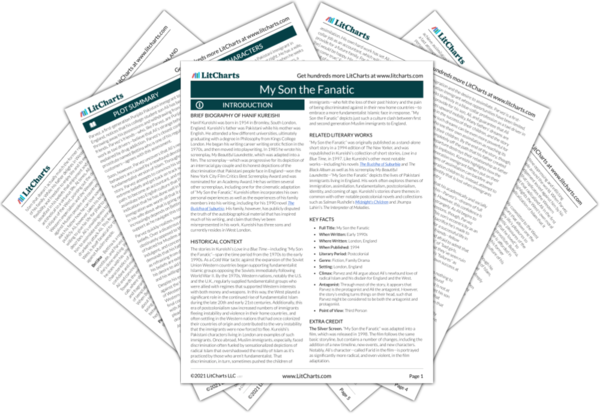In “My Son the Fanatic” the modern conflict between Islam and the West is embodied in the strained relationship between Parvez and his son Ali. Parvez delights in what he views as the flexibility and freedom offered by the Western culture of England. He drinks whiskey, eats pork, maintains an emotional affair with a prostitute, and scoffs at what he and his friends perceive as the hypocrisies of Islamic mullahs telling everyone else how to behave. Ali’s sympathies, however, go in the other direction. He rails against the West and Western culture for its materialism and focus on personal freedom and pleasure above all, as well as for the way that the West views Islam as both inferior and violent while at the same time oppressing and inflicting violence upon Muslim people around the world. When Parvez, in a moment of fury at the judgement levied against him by his son, attacks Ali, it is an action that replicates the Western violence against the Middle East that radicalized Ali in the first place. In this moment, Kureishi highlights the West’s own moral failings and its direct role in the radicalization of Islam that it deplores.
Throughout the story, Parvez is deeply committed to the West and what he believes is its superior culture that allows one the freedom to “do almost anything” and enjoy life’s pleasures to the fullest. Parvez delights in the materialistic pleasures of the West, from bacon, which he “couldn’t deny that he loved,” to whiskey, to his friendly relationship with the prostitute Bettina. Not only does he love the freedoms he feels he is afforded in England, but he desperately wants to abandon his former culture in favor of full assimilation into this new culture of his adopted country.
Ali, in contrast, is deeply committed to Islam, and though his beliefs are rooted in a deeply fundamentalist version of Islam, he does highlight relevant points about the impact that Western freedoms have on the rest of the world. Ali is deeply opposed to the materialism of Western culture, and this opposition is clear from the very beginning of the story when he begins throwing away possessions that, to him, represent the excess and undue attention that Western culture pays to the pursuit of individual pleasure and satisfaction. But Ali’s criticism of the West goes deeper. At one point in the story, Ali asks his father how he can love the West when the West has time and again demonstrated its hatred for immigrants, and especially those from the Islamic world. Through this question, Ali is pointing to the ways that the West inflicts violence and oppression on Muslim people through imperialism that wreaks instability in Muslim-majority countries, and also through the fury and discrimination directed at Muslim immigrants who then move to the West to escape the havoc in their home countries that the West helps create. Ali views Parvez’s desire to assimilate as “grovelling to the whites,” and as a way of reinforcing the global problems of white and Western supremacy. There is truth to Ali’s claim that “the West always thought it was best,” and aims to position other cultures as “inferior.” Parvez himself briefly admits that there is truth in some of Ali’s beliefs about the West, when he confides in Bettina that he thinks “people in the West sometimes felt inwardly empty and that people needed a philosophy to live by.” Though Parvez remains adamantly opposed to the philosophy that Ali has chosen, in this moment he acknowledges that the materialism of the West is at least in part problematic.
Parvez proves Ali’s point about the West in the story’s final scene when, drunk on whiskey and despair, he physically attacks Ali. In this action, Parvez asserts dominance over Ali through violence, just as the West does to the Islamic world. Parvez enacts just the sort of behavior and worldview that radicalized Ali in the first place, and “My Son the Fanatic” more broadly implicates the West in the creation of the fundamentalist strains of Islam that the West deplores.
The West and Islam ThemeTracker

The West and Islam Quotes in My Son the Fanatic
He returned his father’s long looks with more than a hint of criticism, of reproach even, so much so that Parvez began to feel that it was he who was in the wrong, and not the boy!

Unlock explanations and citation info for this and every other My Son the Fanatic quote.
Plus so much more...
Get LitCharts A+In fact they made jokes about the local mullahs walking around with their caps and beards, thinking they could tell people how to live, while their eyes roved over the boys and girls in their care.
Ali then reminded Parvez that he had ordered his own wife to cook pork sausages, saying to her, ‘You’re not in the village now, this is England. We have to fit in!’
‘The problem is this,’ the boy said. He leaned across the table. For the first time that night his eyes were alive. ‘You are too implicated in Western civilization.’
Parvez burped; he thought he was going to choke. ‘Implicated!” he said. ‘But we live here!’
‘The Western materialists hate us,’ Ali said. ‘Papa, how can you love something which hates you?’
‘But I love England,’ Parvez said, watching the boy in the mirror. ‘They let you do almost anything here.’
Ali accused Parvez of ‘grovelling’ to the whites; in contrast, he explained, he was not ‘inferior’; there was more to the world than the West, though the West always thought it was best.
Parvez became aware of Bettina’s short skirt, gaudy rings and ice-blue eyeshadow. He became conscious that the smell of her perfume, which he loved, filled the cab. He opened the window.
The boy neither covered himself nor retaliated; there was no fear in his eyes. He only said, through his split lip, ‘So who’s the fanatic now?’











